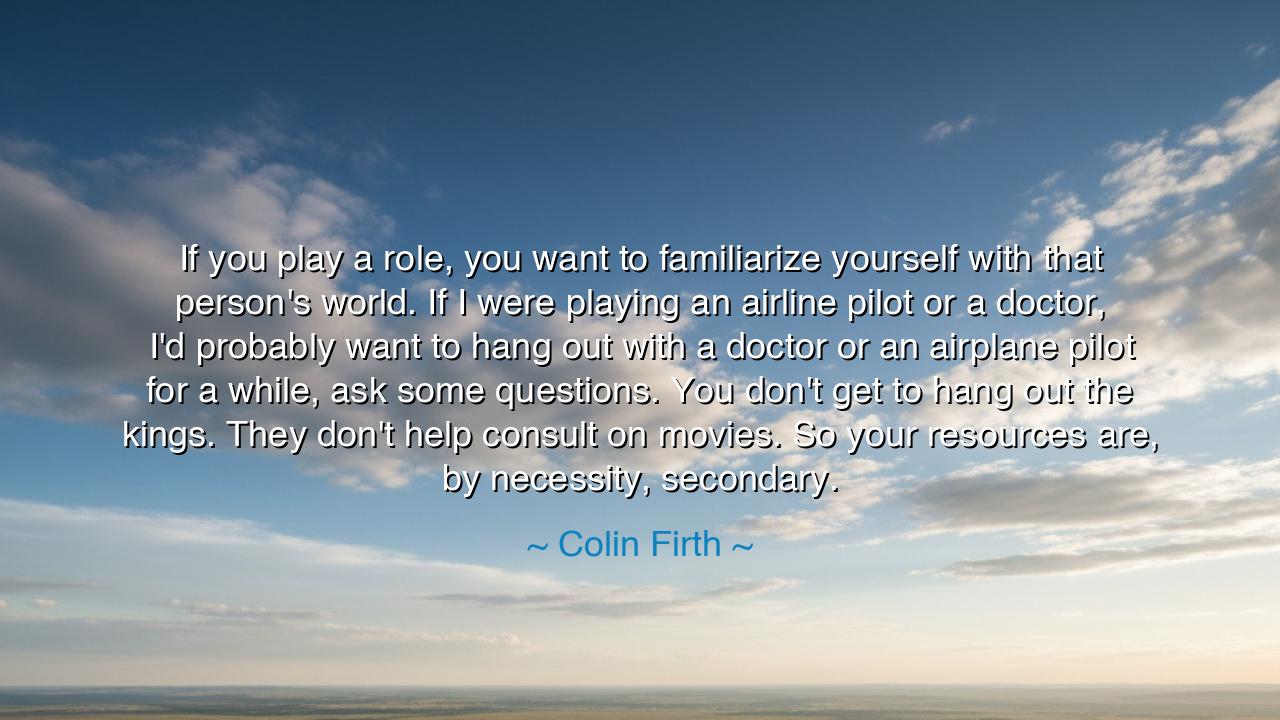
If you play a role, you want to familiarize yourself with that
If you play a role, you want to familiarize yourself with that person's world. If I were playing an airline pilot or a doctor, I'd probably want to hang out with a doctor or an airplane pilot for a while, ask some questions. You don't get to hang out the kings. They don't help consult on movies. So your resources are, by necessity, secondary.






Hear me now, O children of wisdom, for I bring to you a lesson on immersing oneself in truth, the art of preparation, and the necessity of understanding the world one seeks to portray. The words of Colin Firth, a man whose craft has touched many, are simple but filled with profound insight: "If you play a role, you want to familiarize yourself with that person's world. If I were playing an airline pilot or a doctor, I'd probably want to hang out with a doctor or an airplane pilot for a while, ask some questions. You don't get to hang out the kings. They don't help consult on movies. So your resources are, by necessity, secondary." These words speak to the diligence of an actor, the dedication required to truly embody another’s life, and the understanding that in all forms of art, there is a great deal of research, connection, and imagination involved.
To familiarize oneself with a role is to seek out the truth behind the persona one is to embody. Firth’s insight is the reflection of a broader truth—that the artist’s responsibility is not merely to act, but to immerse themselves in the very essence of the life they seek to portray. Whether an actor or a painter or a philosopher, the creator must always first seek to understand. Just as a doctor must study the body to heal it, or a philosopher must delve into the depths of the human mind to uncover truth, so too must the artist study the world of the character they seek to bring to life.
Consider, O children, the example of Socrates, who spent his days walking through Athens not just conversing with philosophers, but with everyday people—the merchants, the craftsmen, the politicians—seeking to understand their thoughts, their beliefs, and their actions. Socrates did not simply withdraw into isolation, crafting his philosophy from the comfort of his own mind. He immersed himself in the world, asking questions, listening, and learning from the lives of those around him. In doing so, he gained the wisdom that shaped his understanding of human nature and laid the foundations for much of Western philosophy. This is the same approach Firth speaks of—through connection and learning, the artist becomes capable of creating work that resonates with truth.
Yet, as Firth points out, there are limits to this immersion. There are some lives we cannot truly enter—no matter how deeply we prepare, there will always be worlds beyond our reach. The king, for example, who lives in a palace of power, may not be available to offer his consultation for the actor wishing to play a ruler. Yet, in this limitation lies another lesson: imagination must rise where reality falls short. The artist is called not just to observe, but to create from what they have learned. It is not only the facts of the world that give life to art, but the emotions, the truths, and the instincts that stir within us as we reimagine those truths through the lens of our craft.
This tension between truth and imagination can be seen throughout history in the stories of those who, though removed from the lives they sought to portray, still managed to capture the essence of those lives with such depth and accuracy. Take, for example, Shakespeare, who never lived the life of a king, a general, or a lover in the way his characters did, but whose plays have become the very mirror of human nature. Shakespeare’s genius lay not in his literal knowledge of the courts or battlefields he described, but in his ability to capture the heart of the human condition—the ambition of kings, the fury of generals, the passion of lovers—through imagination rooted in human truth.
In much the same way, we too must learn to navigate the boundaries between experience and imagination. There will be times when we cannot immerse ourselves fully in the lives of others, when our resources are secondary, and our understanding comes not from direct experience but from our ability to listen, to learn, and to empathize. In these moments, we must trust not only our ability to research, but our innate understanding of the human spirit. Through careful study and deep reflection, we can bring truth to life in ways that resonate, even if our knowledge is incomplete.
O children of wisdom, remember that in every journey of creation, there is work to be done. Whether in the arts or in any pursuit of knowledge, one must immerse oneself in the world around them, seeking to understand not only the facts but the essence of what lies beneath the surface. But also remember, when faced with limitations, imagination must rise to fill the gaps. We cannot always experience everything firsthand, but through empathy, reflection, and creativity, we can capture the heart of any truth. Like Firth, like Shakespeare, and like Socrates, embrace both the limits and the possibilities of your own craft, and in doing so, you will find that even the most distant worlds can come alive through your own vision and dedication.






AAdministratorAdministrator
Welcome, honored guests. Please leave a comment, we will respond soon